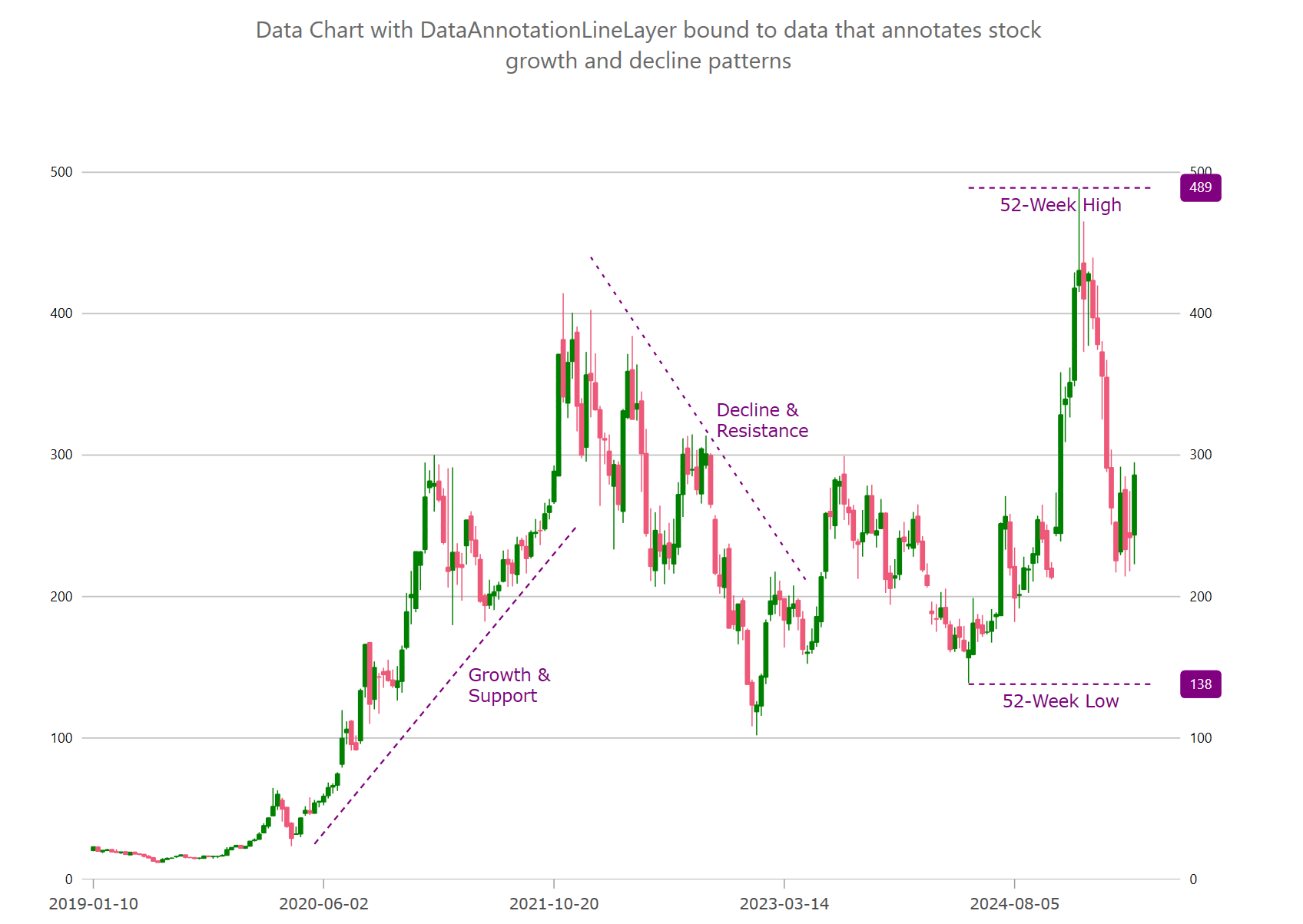
Ultimate UI for WPF では、DataAnnotationLineLayer は、XamDataChart コンポーネントのプロット領域内の 2 つのポイント間に複数の線を描画します。このデータ注釈レイヤーを使用すると、株価の上昇と下落を株価チャートに注釈として表示できます。すべてのシリーズと同様に、DataAnnotationLineLayer も ItemsSource プロパティによるデータ バインディングをサポートしています。このプロパティは、線の開始ポイントと終了ポイントの x/y 座標を表す、少なくとも 4 つの数値データ列を持つデータ項目のコレクションを設定する必要があります。開始ポイントは StartValueXMemberPath および StartValueYMemberPath プロパティを使用してマップする必要があり、終了ポイントは EndValueXMemberPath および EndValueYMemberPath プロパティを使用してマップする必要があります。
たとえば、DataAnnotationLineLayer を使用して、Y 軸に株価の増加と減少のパターン、および株価の 52 週間の高値と安値の注釈を付けることができます。

次のコード スニペットは、上の図に示すように、いくつかのライン注釈レイヤーを描画する方法を示しています。また、この例では、プロット内にカスタム オーバーレイ テキストを描画する方法を示します。詳細については、チャート オーバーレイ テキスト トピックを参照してください。
XAML の場合:
<ig:DataAnnotationLineLayer
StartValueXMemberPath="StartX"
StartValueYMemberPath="StartY"
EndValueXMemberPath="EndX"
EndValueYMemberPath="EndY"
ItemsSource="{Binding}" />C# の場合:
var xAxis = new CategoryXAxis
{
Label = "Date",
DataSource = data,
LabelMargin = new Padding(0, 15, 0, 15),
};
var yAxis = new NumericYAxis
{
MinimumValue = 0,
MaximumValue = 550,
LabelLocation = AxisLabelsLocation.OutsideLeft,
LabelFontSize = 12,
LabelExtent = 80,
LabelMargin = new Padding(8, 3, 8, 5)
};
chart.Axes.Add(xAxis);
chart.Axes.Add(yAxis);
chart.Series.Add(CreateStock52WeekRange(yAxis));
chart.Series.Add(CreateStockGrowthAndDecline(xAxis));
public static Series CreateStock52WeekRange(Axis targetAxis)
{
var annoLayer = new DataAnnotationLineLayer();
annoLayer.StartValueXMemberPath = "StartX";
annoLayer.StartValueYMemberPath = "StartY";
annoLayer.EndValueXMemberPath = "EndX";
annoLayer.EndValueYMemberPath = "EndY";
annoLayer.TargetAxis = targetAxis;
annoLayer.DataSource = new List<Annotation>
{
new Annotation() {
StartX = 190, StartY = 138,
EndX = 230, EndY = 138,
Label = "52-Week Low" },
new Annotation() {
StartX = 190, StartY = 481,
EndX = 230, EndY = 481,
Label = "52-Week High" },
};
// setting optional annotation properties
annoLayer.Brush = Brushes.Purple;
annoLayer.Outline = Brushes.Purple;
annoLayer.AreaFillOpacity = 0.1;
annoLayer.StartLabelXDisplayMode = DataAnnotationDisplayMode.Hidden;
annoLayer.StartLabelYDisplayMode = DataAnnotationDisplayMode.DataValue;
annoLayer.EndLabelXDisplayMode = DataAnnotationDisplayMode.Hidden;
annoLayer.EndLabelYDisplayMode = DataAnnotationDisplayMode.DataValue;
annoLayer.CenterLabelXDisplayMode = DataAnnotationDisplayMode.Hidden;
// adding optional overlay text
annoLayer.OverlayTextColor = Brushes.Purple;
annoLayer.OverlayTextMemberPath = "Label";
return annoLayer;
}
public static Series CreateStockGrowthAndDecline(Axis targetAxis)
{
var annoLayer = new DataAnnotationLineLayer();
annoLayer.StartValueXMemberPath = "StartX";
annoLayer.StartValueYMemberPath = "StartY";
annoLayer.EndValueXMemberPath = "EndX";
annoLayer.EndValueYMemberPath = "EndY";
annoLayer.TargetAxis = targetAxis;
annoLayer.DataSource = new List<Annotation>
{
new Annotation() {
StartX = 48, StartY = 25,
EndX = 105, EndY = 250,
Label = "Growth &\nSupport"
},
new Annotation() {
StartX = 108, StartY = 440,
EndX = 155, EndY = 210,
Label = "Decline &\nResistance"
},
};
// setting optional annotation properties
annoLayer.StartLabelXDisplayMode = DataAnnotationDisplayMode.Hidden;
annoLayer.EndLabelXDisplayMode = DataAnnotationDisplayMode.Hidden;
annoLayer.CenterLabelXDisplayMode = DataAnnotationDisplayMode.Hidden;
annoLayer.AnnotationBackgroundMode = AnnotationAppearanceMode.BrightnessShift;
annoLayer.Brush = Brushes.Purple;
// adding optional overlay text
annoLayer.OverlayTextColor = Brushes.Purple;
annoLayer.OverlayTextMemberPath = "Label";
annoLayer.OverlayTextHorizontalMargin = 60;
annoLayer.OverlayTextVerticalMargin = -10;
return annoLayer;
}次のコード例は、軸注釈の背景、境界線の色、境界線の太さなどのスタイル プロパティをオーバーレイ テキストのスタイル プロパティとして設定して、DataAnnotationLineLayer をカスタマイズする方法を示しています。
C# の場合:
chart.Series.Add(StylingDataAnnotationLineLayer(xAxisBottom));
public Series StylingDataAnnotationLineLayer(Axis targetAxis)
{
var annoLayer = new DataAnnotationLineLayer();
// NOTE see setup properties in the first examples
// styling the starting point of annotation
annoLayer.StartLabelDisplayMode = DataAnnotationDisplayMode.AxisValue;
annoLayer.StartLabelTextColor = Brushes.White;
annoLayer.StartLabelBackground = Brushes.Orange;
annoLayer.StartLabelBorderColor = Brushes.Black;
annoLayer.StartLabelBorderThickness = 1;
annoLayer.StartLabelBorderRadius = 4;
annoLayer.StartLabelPadding = new Thickness(4);
// styling the ending point of annotation
annoLayer.EndLabelDisplayMode = DataAnnotationDisplayMode.AxisValue;
annoLayer.EndLabelTextColor = Brushes.White;
annoLayer.EndLabelBackground = Brushes.Red;
annoLayer.EndLabelBorderColor = Brushes.Black;
annoLayer.EndLabelBorderThickness = 1;
annoLayer.EndLabelBorderRadius = 4;
annoLayer.EndLabelPadding = new Thickness(4);
// styling optional label at center of annotations
annoLayer.CenterLabelDisplayMode = DataAnnotationDisplayMode.AxisValue;
annoLayer.CenterTextColor = Brushes.White;
annoLayer.CenterBackground = Brushes.Green;
annoLayer.CenterBorderColor = Brushes.Black;
annoLayer.CenterBorderThickness = 1;
annoLayer.CenterBorderRadius = 4;
annoLayer.CenterPadding = new Thickness(4);
// styling optional overlay text
annoLayer.OverlayTextColor = Brushes.White;
annoLayer.OverlayTextBackground = Brushes.Green;
annoLayer.OverlayTextBorderColor = Brushes.Black;
annoLayer.OverlayTextBorderThickness = 1;
annoLayer.OverlayTextBorderRadius = 4;
annoLayer.OverlayTextHorizontalMargin = 5;
annoLayer.OverlayTextHorizontalPadding = 2;
annoLayer.OverlayTextVerticalMargin = 5;
annoLayer.OverlayTextVerticalPadding = 2;
return annoLayer;
}次の表は、DataAnnotationLineLayer の最も重要なプロパティとその説明を示しています。